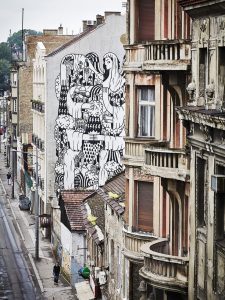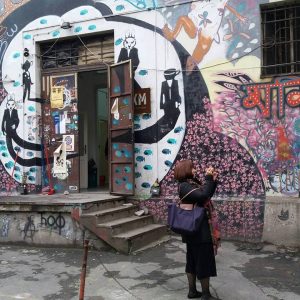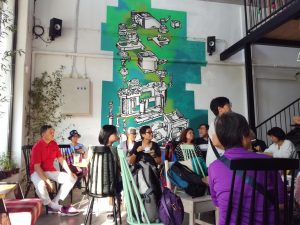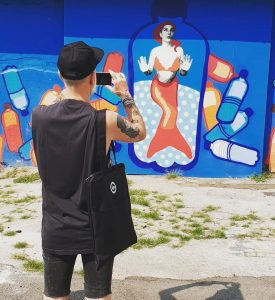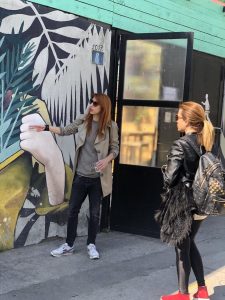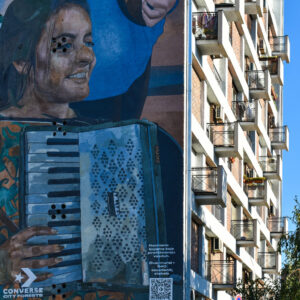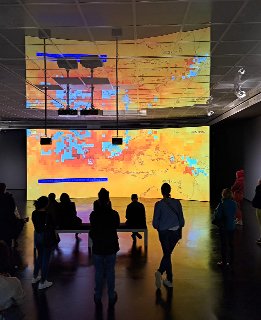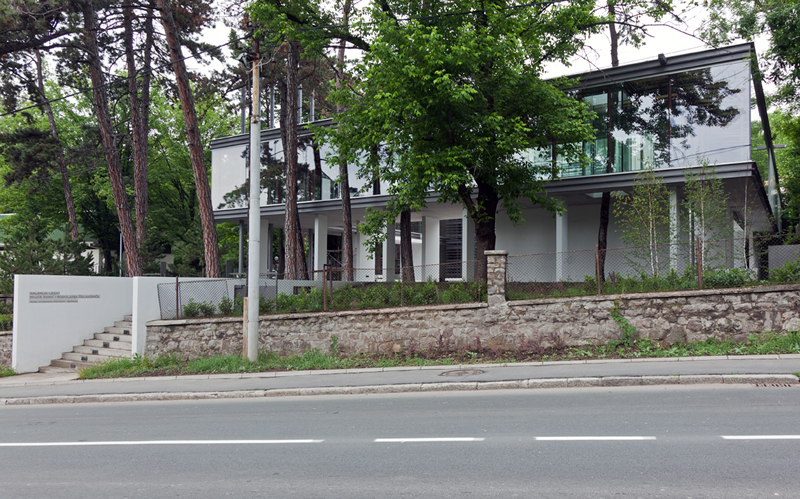
The Gallery-Legacy of Milica Zorić and Rodoljub Čolaković (2 Rodoljuba Čolaković St.)
July 14- August 21, 2017
Working hours: from 12 p.m. to 8 p.m. except Tuesdays
Admission is free of charge.
Curated by Swiss Institute with Julie Boukobza, with Ana Anakijev and Miloš Zec as assistant curators.
Produced by Balkan Projects.
Artists: Danai Anesiadou, Darja Bajagić, Dora Budor, Ulises Carrión, Heman Chong, Brice Dellsperger, Aleksandra Domanović, Mathis Gasser, Daiga Grantina, Siniša Ilić, Alex Israel, Bertrand Lavier, William Leavitt, Christian Marclay, Rodrigo Matheus, Benjamin Ramírez Pérez, Carissa Rodriguez, Bojan Šarčević, Amie Siegel, Tobias Spichtig, Raša Todosijević
Inhabiting the rooms of the Museum of Contemporary Art – Belgrade’s Milica Zorić and Rodoljub Čolaković Gallery-Legacy, FADE IN 2: EXT. MODERNIST HOME – NIGHT investigates the role that art plays in narrative film and television. The exhibition acts as a sequel to FADE IN: INT. ART GALLERY – DAY, which was on view at Swiss Institute / Contemporary Art, New York in March 2016. This new iteration allows participating artists to further reclaim the manner in which art is represented on screen, whether as props, set dressings, plot devices, or character cues.
The nature of the exhibition is such that sculptures, paintings, performances and installations transition from prop to image to art object, staging an enquiry into whether these fictional depictions in mass media ultimately have greater influence in defining a collective understanding of art than art itself does. Certain preoccupations with artworks are established early on in cinematic history: the preciousness of art objects anchors their roles as plot drivers, and anxieties intensify regarding the vitality of artworks and their perceived abilities to wield power over viewers or to capture spirits. Across genres, the character of the artist is habitually portrayed as a volatile, mercurial figure with license to subvert societal norms, who is thereby ridiculed, feared and revered. From many such narratives, FADE IN 2 draws out the art objects, granting them the status only previously achieved on-screen, whilst pointing to moments in which one form of media wrangles with the power of another.
FADE IN 2 reimagines the original exhibition in the Gallery-Legacy Čolaković, the converted former residence of Milica Zorić and Rodoljub Čolaković, now one of a venues of the Museum of Contemporary Art, Belgrade. The space’s storied history as a residence, hotbed of organized crime and art museum further reinforces the exhibition’s ambition to recast the gallery in a new role as a set for dramatic scenes. Newly commissioned works in the exhibition by Darja Bajagić, Aleksandra Domanović and Siniša Ilić delve into the canon of Serbian and Ex-Yugoslavian cinema, enabling a coalescence of filmic, social and political histories.
In addition to new commissions made for FADE IN by Dora Budor, Brice Dellsperger, Mathis Gasser, Bertrand Lavier, Christian Marclay, Carissa Rodriguez and Amie Siegel, FADE IN 2 features additional new works from Danai Anesiadou, Daiga Grantina, Rodrigo Matheus, Benjamin Ramírez Pérez and Tobias Spichtig. Source material ranges widely from Rondo (1966) and La Collectionneuse (1967) through Xanadu (1980) and Risky Business (1983), to Žena s Krajolikom (1976), The Princess Diaries (2001), and The X-Files (1993-2002).
Screening program organized in collaboration with Jugoslovenska kinoteka / Yugoslav Film Archive, Belgrade. Please see the schedule below.
Jugoslovenska kinoteka / Yugoslav Film Archive
Uzun Mirkova 1, Belgrade, Serbia
15 July 6 p.m. Sedam i po (2006) – Miroslav Momčilović
15 July 8.30 p.m. The Maltese Falcon (1941) – John Huston
16 July 6 p.m. Vizantijsko plavo (1993) – Dragan Marinković
16 July 8.30 p.m. 9 ½ Weeks (1986) – Adrian Lyne
17 July 6 p.m. Lijepe žene prolaze kroz grad (1986) – Želimir Žilnik
17 July 8.30 p.m. Teorema (1968) – Pier Paolo Pasolini
18 July 6 p.m. W.R. Misterija organizma (1971) – Dušan Makavejev
18 July 8.30 p.m. The Thomas Crowne Affair (1999) – John McTiernan
19 July 6 p.m. Tajvanska kanasta (1985) – Goran Marković
19 July 8.30 p.m. Vertigo (1958) – Alfred Hitchcock
20 July 6 p.m. Mlad i zdrav kao ruža (1971) – Jovan Jovanović
20 July 8.30 p.m. Great Expectatios (1998) – Alfonso Cuarón
Swiss Institute is a non-profit art space dedicated to promoting forward thinking and experimental art making. For over 30 years, Swiss Institute has come to be known for presenting experimental and thoughtful exhibitions. Committed to the highest standards of curatorial and educational excellence, Swiss Institute serves as a platform for emerging artists, catalyzes new contexts for celebrated work, and fosters appreciation for under-recognized positions.
Heralded by The New York Times as a “small gem” with “extraordinary programming”, Swiss Institute is open to the public free of charge five days a week. Swiss Institute’s ten annual exhibitions and robust public program series provide a significant forum for contemporary, international cultural dialogue in the fields of visual and performing arts, design and architecture.
Balkan Projects is the exciting new initiative of Marija Karan, which aims to actively engage the Balkan art scene in a larger international context.
Balkan Projects plans to put the Balkans back on the map of contemporary art by building new awareness of local talent, both present and past, opening opportunities for dialogue with a greater arts community around the world, and ensuring that they are no longer ‘lost in translation’. Through diverse activities — exhibitions, events, and mutual exchanges between local and international artists, curators, and critics, and collectors — Balkan Projects aims to create a new infrastructure for a thriving art scene. Now more than ever before, contemporary art is one of the most effective and exciting ways of gathering and exchanging ideas, of healing and enriching people’s lives, and of effecting change in many aspects of society.
To contend with the historically fragmented nature of the region, the Balkan Projects will adopt a deliberately migratory strategy for its initiatives. It is intended that a series of annual exhibitions and events planned by Balkan Projects will take place, moving from one Balkan country to the next and gathering impetus and critical mass until the uniting vision of the initiative is complete.
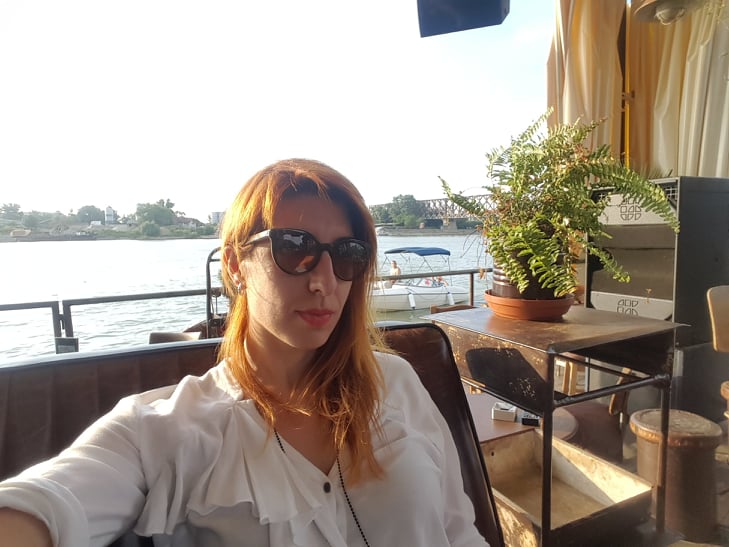
Writer. Blogger. Traveler. Researcher. Electronic Music Lover.








